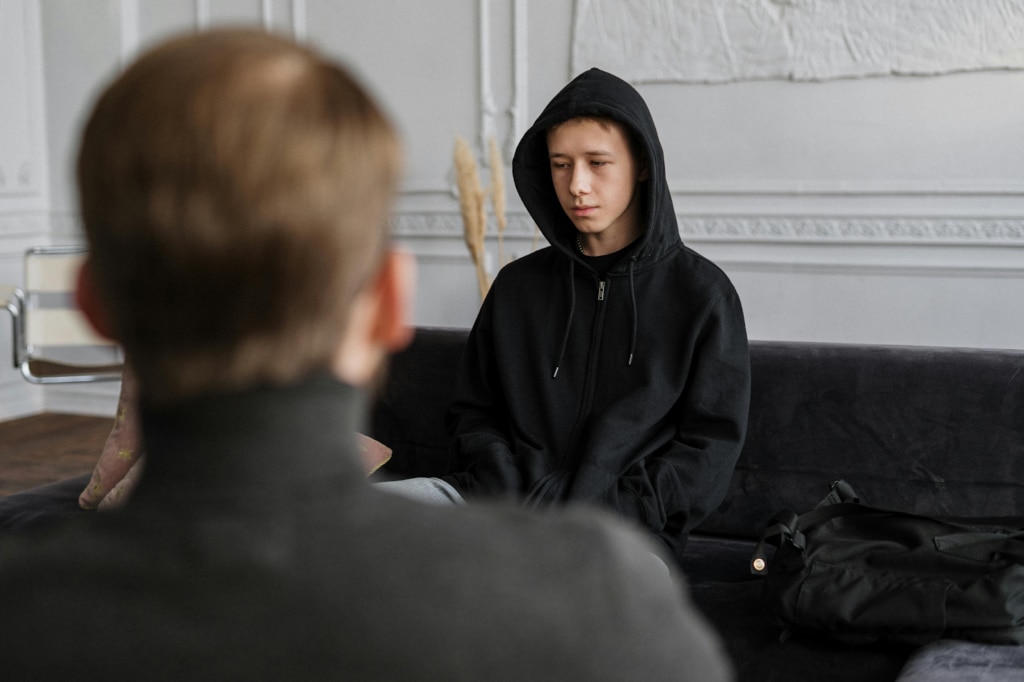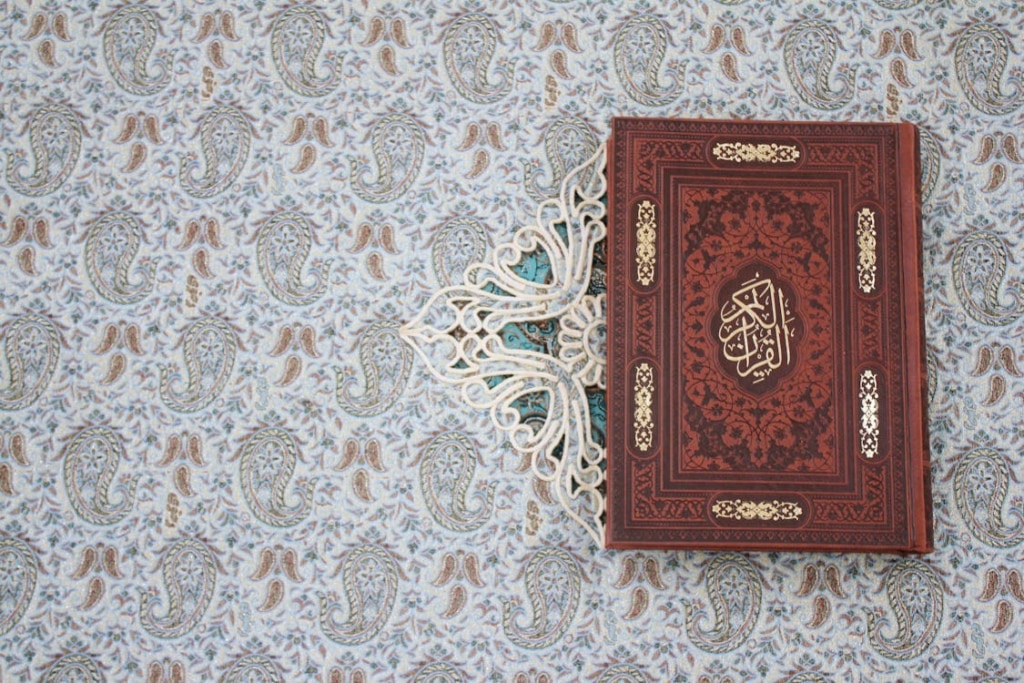Guidance regarding basic Islamic issues that Hazrat Amirul Momineen, Khalifatul Masih Vaa, has given on various occasions in his written correspondence and during MTA programmes is being published officially below for everyone’s benefit.
Can a qazi reject a woman’s khul‘ (divorce) request?

Someone wrote to Hazrat Amirul Momineen, Khalifatul Masih Vaa, posing this question: “If a qazi believes a wife’s petition for separation is without valid grounds, is he permitted to prevent her from leaving her husband’s residence? In such circumstances, would the conjugal relations between the couple be considered illegitimate? Additionally, if a woman is subjected to treatment inferior to that of slaves, how can an individual profess to uphold the highest ethical standards, given that even slaves possess the unequivocal right to seek emancipation?”
Huzoor-e-Anwaraa, in his letter dated 7 March 2023, offered the following guidance regarding this query:
“A woman possesses the right to khul‘ in the very same manner as a man holds the right to divorce. The sole distinction lies in the fact that a woman exercises this right through a court of law or the Qaza system. The Promised Messiahas states in this regard:
“‘The Islamic sharia does not vest this prerogative in the hands of the husband alone, such that if he perceives any flaw or incompatibility, he may pronounce talaq upon his wife. Rather, it also endows the woman with the entitlement to obtain a divorce through the judicial authority. When a woman obtains a divorce by recourse to the authorities, this is denominated in Islamic terminology as khul‘.’ (Chashma-e-Ma‘rifat, Ruhani Khazain, Vol. 23, p. 288)
“The court or Qaza can strive to bring about reconciliation between the parties to a certain degree. In furtherance of this endeavour, the appointment of two arbiters [hakamayn] between them is also prescribed. (Surah an-Nisa’, Ch.4: V.36) However, even after these reconciliation efforts, if a woman remains adamant on seeking khul‘ and offers no justification, the qazi still does not possess the authority to reject her khul‘ application. The Qaza is obligated to process her request. Nevertheless, if she provides no reason for seeking khul‘ nor can she substantiate any fault on her husband’s part for this khul‘, then in such a situation, she would have to relinquish her rights, such as her mahr and so on.
“As for conjugal relations between husband and wife after the woman has filed for khul‘, they remain husband and wife until the qazi decides on the woman’s request and any marital relations that take place during that period are deemed permissible.
“Concerning the Islamic directive that spouses should maintain a shared residence during the ‘iddah period following a talaq (Surah at-Talaq, Ch.65: V.2), the underlying wisdom is the possibility of fostering reconciliation between them. Guided by this Quranic teaching, Hazrat Musleh-e-Maudra also instructed that a woman petitioning for khul‘ should do so while in her husband’s home, unless that presents a danger to her life or her faith. In such circumstances and with the Qaza’s authorisation, the woman may pursue khul’ from outside her husband’s home. (Al Fazl, Qadian, No. 177, Vol. 30, 1 August 1942, p. 2)
“In response to the second part of your question, please note that Islam has taught its followers to treat their wives with kindness. Thus, those who oppress their wives and treat them like slaves are in the wrong and are deemed sinful in the sight of Allah the Almighty. Islam has clearly enjoined fair and benevolent treatment of women. Hence, it has been commanded:
عَاشِرُوهُنَّ بِالْمَعْرُوفِ
“‘Consort with them in kindness.’ (Surah an-Nisa’, Ch.4: V.20)
“Moreover, the Holy Prophetsa, while exhorting good treatment of wives, instructed the Ummah that the best among you is the one who is best to his wife. (Sunan at-Tirmidhi, Kitab al-manaqib, Bab fadli azwajin-nabiyyisa)
“The Promised Messiahas states in this regard:
“‘With the exception of indecency, you ought to bear with patience all the other improprieties and discourteous behaviour of your wives. […] I find it utterly shameful for a man to be in a state of conflict with a woman. God has made us men, and in reality, this is a completion of His favour upon us. The gratitude that we owe for this is to treat women with kindness and tenderness.’ (Al Hakam, No. 2, Vol. 4, 17 January 1900, p. 3)”
Is music allowed in Islam?

Someone from Indonesia wrote to Hazrat Amirul Momineen, Khalifatul Masih Vaa, enquiring about Islam’s perspective on music and musical instruments.
In his letter, dated 9 March 2023, Huzoor-e-Anwaraa gave the following reply:
“It is permissible under the Islamic sharia to listen to such songs, poems and chants that are not accompanied by dancing, etc. and are free from any moral impropriety. Ahadith recount various occasions on which, during times of joy or at weddings, girls sang such songs and chants in the presence of the Holy Prophetsa and he did not prevent them; indeed, when anyone attempted to stop them, the Holy Prophetsa said, ‘Do not trouble these girls.’ (Sahih al-Bukhari, Kitab al-jumu‘ah, Bab al-hirabi wa d-daraqi yawma l-‘id)
“Likewise, on one wedding occasion, the Holy Prophetsa told Hazrat Aishara that the Ansar, into whose family the bride was being married, delighted in melodious singing. He therefore advised her to send with the bride a few young girls of pleasant voice, who would sing: ‘We are come to you, we are come to you; may Allah preserve us and preserve you.’ (Sunan Ibn Majah, Kitab an-nikah, Bab al-ghina’i wa d-duff)
“However, whenever the Holy Prophetsa observed or sensed anything inappropriate in such songs or chants, he immediately forbade the singers.” (Sahih al-Bukhari, Kitab al-maghazi, Bab shuhudi l-mala’ikati badran)
“The Promised Messiahas, while rendering a commentary on the verses of Surah an-Nur, states:
“‘[These verses command the Holy Prophetsa to] direct the believing men to restrain their eyes from looking at women outside the prohibited degrees so openly as to be sexually excited by them and to cultivate the habit of guarding their looks. And should safeguard their private parts at all costs. Likewise, they should restrain their ears outside the prohibited degrees; that is, they should not listen to the singing or beguiling voices of women outside the prohibited degrees, nor should they listen to descriptions of their beauty. This is a good way of preserving the purity of their looks and hearts. In the same way, direct believing women that they should restrain their eyes from looking at men outside the prohibited degrees and should safeguard their ears against listening to the voices of such men. That is, they should not listen to the voices which sexually excite them.’ (Islam Ki Usul Ki Falasafi, Ruhani Khazain, Vol. 10, pp. 341-342)
“After describing the decline of Muslim rule across various Islamic countries, Hazrat Musleh-e-Maudra states:
“‘Despite witnessing such catastrophic ruin, Muslims still passionately indulge in cinema and musical entertainment, deriving no lessons whatsoever from their history. Yet, the Holy Quran explicitly instructs in the words وَالَّذِیْنَ لَا یَشْھَدُوْنَ الزُّوْرَ’ (Surah al-Furqan, Ch. 25: V. 73), that if Muslims aspire to become ‘Ibad-ur-Rahman [i.e., Servants of the Gracious God], it is incumbent upon them, above all else, to shun gatherings of music and song and devote themselves wholeheartedly to the One God. Should they adhere to this, they shall attain success; failing this, they cannot evade the disastrous consequences.’ (Tafsir-e-Kabir, Vol. 9, UK, 2023, pp. 218–219) [According to Lane and ‘Aqrab, زُوْر means a lie; a falsehood; false witness; association of others with God; a place where lies are told; a place where people hear singing and entertain themselves with vain or frivolous diversion; the assemblies of polytheists; strength, etc. —Editor Al Hakam]
“However, with regard to the permissibility of decent songs during wedding festivities, Hazrat Musleh-e-Maudra further elucidates:
“‘On the occasion of marriage, singing is permissible according to the sharia. However, such songs must either possess religious merit or be entirely harmless in nature. For example, general wedding songs, typically sung in a light-hearted and innocent manner, pose no moral objection, for they are merely sung to enliven hearts and exert no detrimental influence on one’s ethical conduct.’ (Farmudat-e-Musleh-e-Maud dar barah Fiqhi Masa’il, p. 220)
“In response to a specific question, he stated that there is no sin in singing a song during wedding celebrations, provided the lyrics contain neither obscenity nor idle nonsense and the manner of singing remains modest and dignified. (Farmudat-e-Musleh-e-Maud dar barah Fiqhi Masa’il, p. 221)
“Hence, in summary, listening to songs is not intrinsically haram. Therefore, on festive occasions such as weddings or other joyous gatherings, singing and listening to songs couched in pure, wholesome verse, provided they contain no hint of indecency, entail no risk of arousing base passions and do not degenerate into a frivolous waste of time.“As for musical instruments, certain ahadith mention the permissibility of the daff. (Sunan at-Tirmidhi, Kitab an-nikah, Bab ma ja’a fi i‘lani n-nikah) The Holy Prophetsa himself elucidated its intended purpose as a means of publicly announcing marriage ceremonies, etc. Hence, the use of such instruments for a purposeful objective (as in olden times, when armies in war would be stirred to defend their homeland by patriotic chants and poems recited to the accompaniment of these instruments) is permissible. However, in this era, many musical instruments are employed aimlessly and merely for senseless dancing and singing, such as various forms of pop music, which not only involve vulgarity and lead people towards unworthy pursuits but also lack any meaningful purpose. Therefore, using these instruments in such a manner is inappropriate.”
What are children’s rights in Islam and can one ever question parents’ wrongdoing?

Someone wrote to Hazrat Amirul Momineen, Khalifatul Masih Vaa, describing their difficulties and hardships. They asked whether parents who fail to understand their children and subject them to physical and emotional abuse still deserve not to be addressed, even with ‘uff’ (an Arabic expression of annoyance, as described in Surah Bani Isra’il, Ch. 17, V. 24) and whether children have any rights at all.
In his letter, dated 11 March 2023, Huzoor-e-Anwaraa offered the following guidance on this matter:
“Islam is a perfect religion whose teachings represent a balanced framework, comprehensively outlining the rights and responsibilities of every stratum of society.
“The Holy Quran, on the one hand, highlights the many rights parents possess – particularly mothers – on account of the difficulties they endure from the beginning of pregnancy through childbirth and their children’s early upbringing. On the other hand, the Holy Quran also makes parents responsible for their children’s tarbiyat and nurturing, labelling negligence in this regard as tantamount to the ‘murder of children’. (Haqaiq-ul-Furqan, Vol. 2, p. 192) It further includes the failure to provide a proper upbringing to the children among such acts as well. (Tafsir-e-Kabir, Vol. 6, UK, 2023, p. 333)
“Moreover, the Holy Prophetsa imparted numerous teachings regarding the nurturing of children and safeguarding their dignity and self-respect. Thus, he said, ‘Respect and honour your children and teach them good manners.’ (Sunan Ibn Majah, Kitab al-adab, Bab birri l-walidi wa l-ihsani ila l-banat)
“In relation to showing kindness and love to children, the Holy Prophetsa stated, ‘He who does not show mercy to our young ones is not of us.’ (Sunan Abi Dawud, Kitab al-adab, Bab fi r-rahmah) Likewise, once some Bedouins came to the Holy Prophetsa and asked the Companions whether Allah’s Messengersa would kiss his children. On hearing that the Companions answered in the affirmative, they remarked, ‘By Allah, we never kiss our children.’ The Holy Prophetsa responded, ‘If Allah has removed mercy and compassion from your hearts, then I bear no responsibility for that.’ (Sahih Muslim, Kitab al-fada’il, Bab rahmatihi sallAllahu ‘alayhi wa sallama as-sibyana wa l-‘iyal)
“Hence, just as Islam instructs children to honour and respect their parents, it also enjoins parents to treat their children with love, kindness and compassion, to attend to their legitimate needs and to provide them with the best possible upbringing, thereby moulding them into beneficial members of society. Should parents fail in fulfilling this duty, they will be held accountable before Allah the Almighty on the Day of Judgement. Furthermore, if any parents commit physical abuse against their children, they forfeit the right not to be addressed with ‘uff.’ Accordingly, such parents may be reported to the appropriate Jamaat authorities as well as the relevant legal institutions.
“As for the mental stress you have described, you should frequently recite:
لَا حَوْلَ وَلَا قُوَّةَ إِلَّا بِاللَّهِ الْعَزِيزِ الْحَكِيمِ
“[‘There is no power or strength except with Allah, the Mighty, the Wise.’]
“Moreover, you should engage in abundant istighfar and pray fervently for your wellbeing during your salat. May Allah the Almighty alleviate all your anxieties and difficulties, bestow upon you His special grace, envelop you in His love and continuously bless you with His grace. Amin.”
What are the implications of an irrevocable Islamic divorce (talaq) on marital relations?

Respected Amir Sahib of a country presented a matter concerning three divorces, along with the fatwa issued by respected Mufti Sahib, to Hazrat Amirul Momineen, Khalifatul Masih Vaa, seeking guidance.
In his letter, dated 25 March 2023, Huzoor-e-Anwaraa offered the following instruction on this matter:
“The fatwa issued by the respected Mufti Sahib concerning this matter is entirely correct. Given that, in addition to the husband’s own acknowledgement of these divorces, there also exist three separate written pronouncements of divorce issued by him at various times, there remains no plausible basis upon which the validity of these divorces can be denied.
“Therefore, three divorces have indeed been conclusively established between the two parties. Concerning any marital relations that may have occurred between them after these divorces, whether arising out of ignorance or a lack of understanding, such actions, irrespective of their circumstances, are nevertheless contrary to Islamic sharia. Both parties must therefore abundantly seek forgiveness from Allah and, to the best of their ability, engage in giving sadaqah and charitable deeds.
“May Allah the Exalted bestow upon both parties wisdom and discernment and enable them fully to adhere to the true teachings of Islam. Amin.”
What is the Ahmadiyya Muslim Jamaat’s stance on Darwinism?

A lady from the UK wrote to Hazrat Amirul Momineen, Khalifatul Masih Vaa, regarding a footnote by Hazrat Khalifatul Masih IVrh under verse 66 of Surah al-Baqarah in his Urdu translation of the Holy Quran. She stated that the passage led her to believe Darwin’s theory was correct, whereas the Jamaat considers Darwin’s theory of evolution incorrect.
In his letter, dated 25 March 2023, Huzoor-e-Anwaraa provided the following reply:
“You are indeed correct that the Ahmadiyya Muslim Community does not accept Darwin’s theory of evolution with regard to the creation of mankind. On various occasions, Hazrat Musleh-e-Maudra explicitly rejected Darwin’s theory; notably, in his speech titled Sair-e-Ruhani Number 1, published in Anwar-ul-Ulum, volume 15, he presented an extensive and detailed refutation of Darwin’s theory with compelling arguments. Similarly, Hazrat Khalifatul Masih IVrh, on numerous occasions in his speeches and question-and-answer sessions, unequivocally rejected Darwin’s theory and provided a comprehensive rebuttal of it in his book Revelation, Rationality, Knowledge and Truth. To attain a clearer and deeper understanding of this issue, you should study both of these works carefully.
“With regard to the footnote under verse 66 of Surah al-Baqarah in Hazrat Khalifatul Masih IV’srh Urdu translation, it must be interpreted within the broader context of his other discourses and writings. As explained above, Hazrat Khalifatul Masih IVrh consistently maintained that Darwin’s theory is incorrect. Consequently, the intended meaning of this footnote is merely to clarify the Quranic metaphor of referring to morally corrupt religious scholars as ‘apes’. This metaphor does not imply that these scholars were literally transformed into monkeys; rather, it signifies that such corrupted scholars descended from their noble status as ‘the noblest of creation’ to the lowly and degraded condition symbolically represented by apes.”
(Compiled by Zaheer Ahmad Khan, Head of Records Department, Private Secretariat, London. Translated by Al Hakam.)

